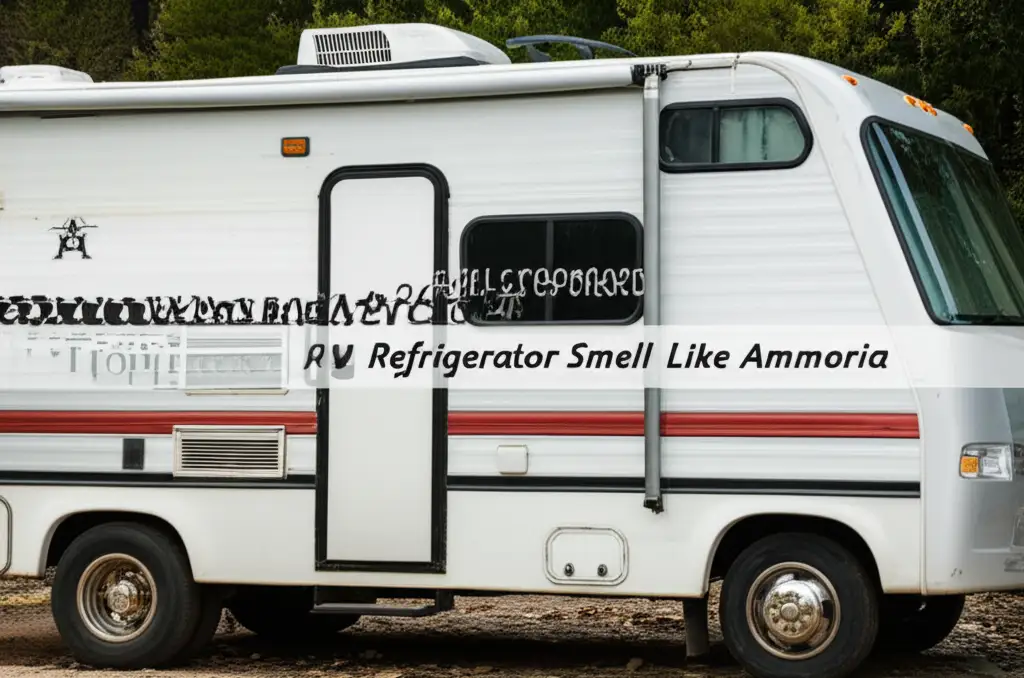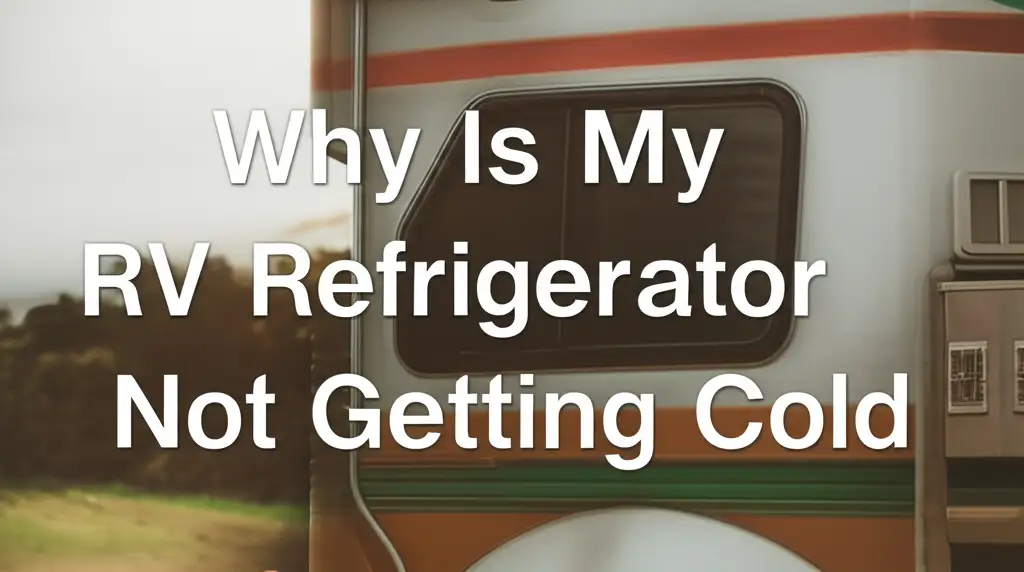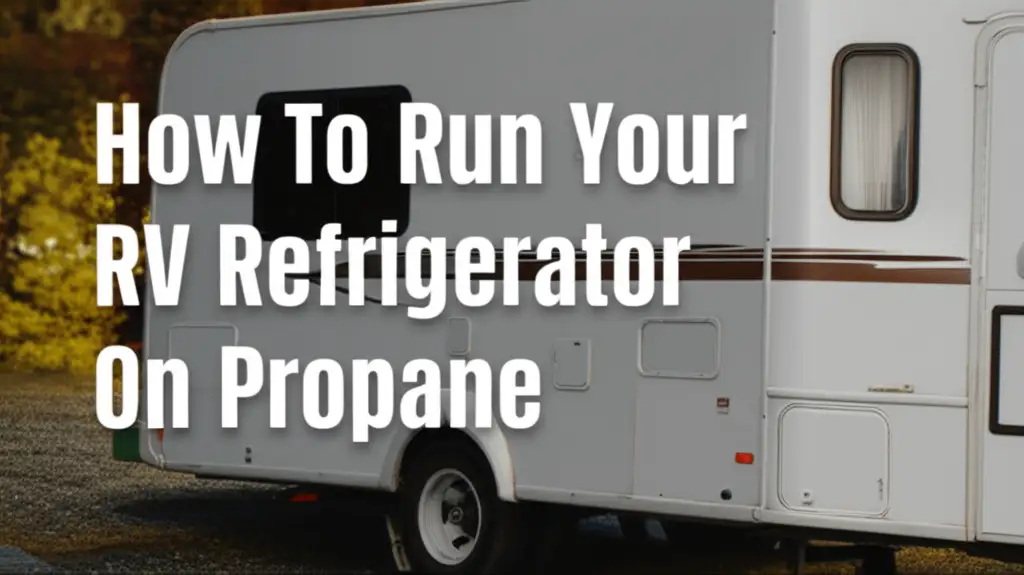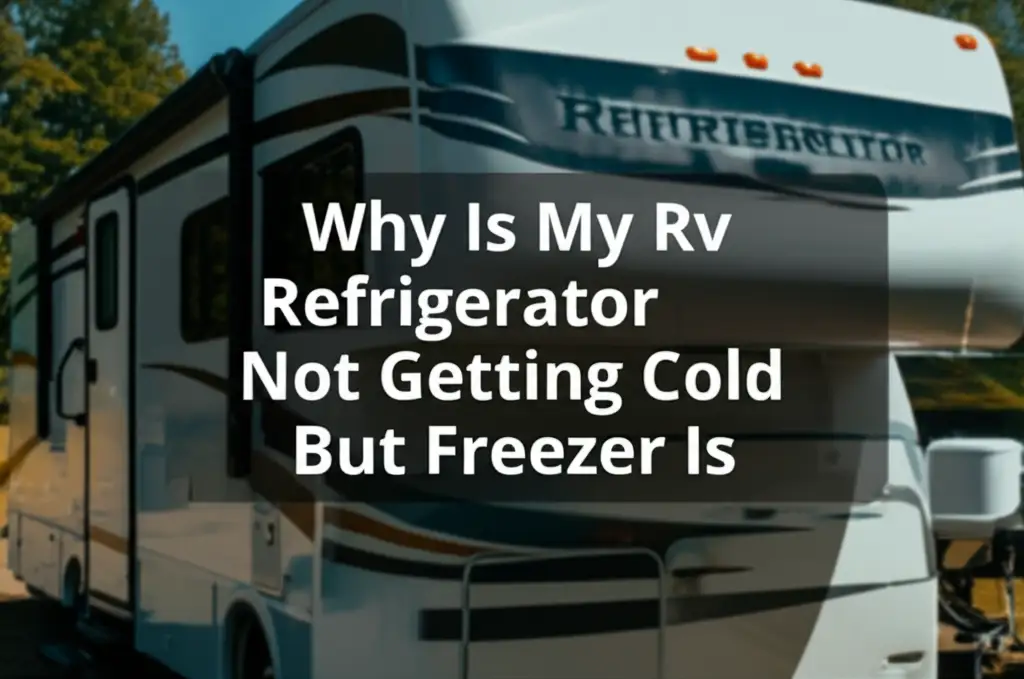· Davia Murnell · RV Maintenance · 23 min read
Why Does The Fan In My Rv Refrigerator Keeps Running
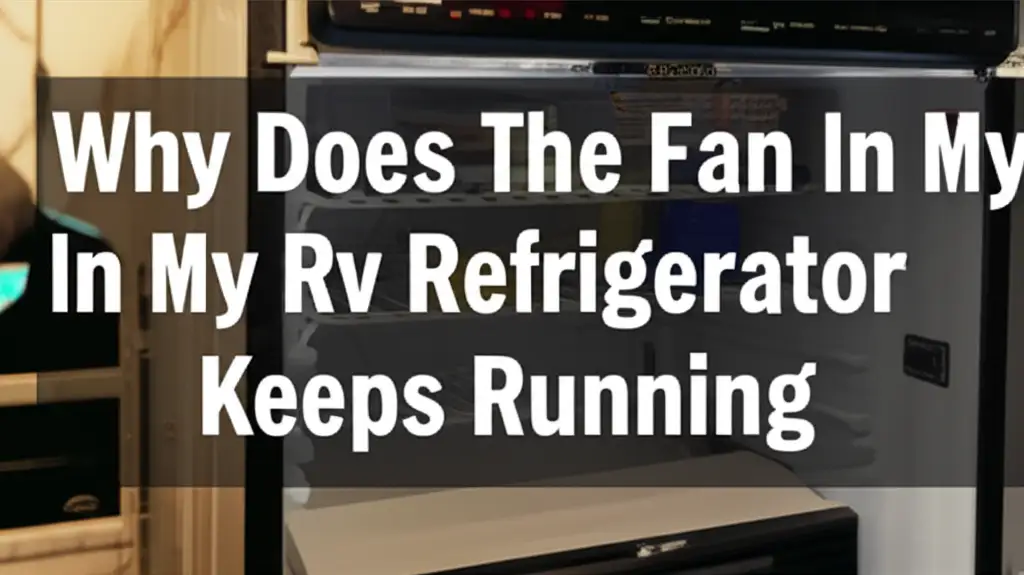
Why Does Your RV Refrigerator Fan Keep Running?
Embarking on a road trip in your RV offers unparalleled freedom. However, nothing sours the experience faster than a malfunctioning appliance. One common annoyance RV owners face is when their RV refrigerator fan keeps running without pause. This constant hum can be irritating, but it often signals an underlying issue that needs attention. I understand how frustrating it feels when your fridge doesn’t act as it should.
Your RV refrigerator’s fan plays a vital role in its cooling efficiency. It ensures proper airflow over critical components, helping to dissipate heat. When this fan runs continuously, it indicates the refrigerator is working harder than usual. This might be due to various factors, from simple ventilation blockages to more complex electrical or mechanical failures. We will explore the common culprits behind a perpetually running RV fridge fan. You will learn how to diagnose these problems and find practical solutions. This guide helps you restore peace to your RV and ensure your food stays perfectly chilled.
Takeaway
- Check Ventilation: Ensure all vents around your RV refrigerator are clear and unobstructed to promote proper airflow.
- Monitor Temperature: Verify the refrigerator’s internal temperature is within the correct range, around 35-40°F.
- Inspect Fan Components: Look for dirt, debris, or damage on the condenser coils and the fan blades themselves.
- Assess Electrical System: Confirm stable power supply to the refrigerator and test the thermostat or thermistor for proper function.
- Consider Professional Help: If basic troubleshooting fails, consult a qualified RV technician for complex electrical or sealed system issues.
Clear, Concise Answer
Your RV refrigerator fan keeps running due to poor ventilation, high ambient temperatures, a faulty thermostat or thermistor, dirty condenser coils, an iced-up evaporator, or a continuously drawing power fan. These issues force the refrigerator to work harder, requiring the fan to run longer to maintain set temperatures and dissipate heat.
Understanding Your RV Refrigerator Fan’s Crucial Role
Your RV refrigerator relies heavily on its internal and external fan systems for efficient operation. These fans are not just minor components; they are essential for keeping your food cold, especially in varying outdoor temperatures. Understanding their purpose helps you diagnose issues when your RV refrigerator fan keeps running constantly. I have seen many RV owners overlook the importance of these small but mighty parts.
The Inner Workings of RV Fridge Fans
Most RV refrigerators use an absorption cooling system. This system generates heat as part of its cooling process. The fans help manage this heat effectively. There are typically two types of fans in an RV refrigerator setup:
- Evaporator Fan (Internal): This fan sits inside the fresh food compartment. Its job is to circulate cold air evenly throughout the refrigerator. This circulation prevents hot spots and ensures consistent cooling for all your items. If this fan stops, some areas might get too warm, forcing the compressor to work harder.
- Condenser/Ventilation Fan (External): Located in the back access compartment of your RV fridge, this fan is crucial for heat dissipation. The absorption process creates significant heat at the condenser coils. This fan pulls cooler ambient air across these hot coils. It then exhausts the warm air out through the upper vent or roof. Without proper airflow from this fan, heat builds up. This buildup causes the refrigerator to struggle, making the fan run continuously.
Both fans work together to maintain optimal cooling performance. The internal fan ensures cold air reaches your food. The external fan prevents overheating of the cooling unit itself. When either fan malfunctions or conditions make their job harder, you might notice your RV refrigerator fan keeps running without stopping. This continuous operation signals that the system is struggling to reach or maintain the desired temperature. We need to look for specific reasons why this happens.
Common Reasons Your RV Fridge Fan Runs Constantly
When your RV refrigerator fan keeps running, it indicates the cooling system is under stress. This constant operation often points to specific underlying problems. These issues prevent the fridge from efficiently reaching or maintaining its target temperature. I find that most constant fan issues stem from a few common culprits.
Overheating and Inadequate Ventilation
One of the most frequent reasons for a continuously running fan is inadequate ventilation. RV refrigerators require proper airflow around their condenser coils to dissipate heat. If the rear compartment vents are blocked, dirty, or if the RV is parked in direct sunlight, heat can build up. This increased heat forces the fan to work overtime. The fan struggles to push hot air out and pull cooler air in. Imagine trying to cool a room with closed windows on a hot day; the AC would run non-stop. This is similar to what happens in your RV fridge.
Consider checking these ventilation points:
- Rear Access Panel Vents: These are the louvered covers on the outside of your RV, usually near the fridge. Ensure they are free from debris like leaves, dirt, or insect nests.
- Roof Vent: Some RV fridges vent hot air through the roof. Make sure this vent is clear and unobstructed.
- Internal Spacing: Verify that there is enough clear space around the refrigerator unit inside its cabinet. RVs often have tight spaces, but proper installation includes baffling to direct airflow.
Poor ventilation makes your RV refrigerator fan keeps running because the unit cannot shed heat efficiently. This issue puts a strain on the entire cooling system.
Faulty Thermostat or Thermistor
The thermostat or thermistor acts as the brain of your RV refrigerator’s cooling system. It monitors the internal temperature and tells the cooling unit and fans when to activate or deactivate. If this component is faulty, it might send incorrect temperature readings. It could tell the fan that the fridge is warmer than it actually is, or that it needs to cool down more.
Here’s how a malfunction can cause the fan to run continuously:
- Incorrect Readings: A defective thermistor might register a higher temperature than the actual internal temperature. This makes the fridge cooling unit and fan believe more cooling is needed, leading to continuous operation.
- Stuck “On” Signal: The thermostat could be stuck in an “on” position. This continuously signals the fan to run, regardless of the actual temperature inside the fridge.
- Loose Connections: A loose wire or connection to the thermostat/thermistor can also lead to erratic readings or constant “on” signals.
A simple test with an accurate thermometer placed inside your fridge can help you verify if the actual temperature matches what the fridge thinks it is. If your RV refrigerator is not getting cold but the freezer is, this could also point to a thermistor issue impacting temperature regulation in the main compartment, forcing the fan to compensate. You can read more about it here: Why Is My RV Refrigerator Not Getting Cold But Freezer Is?
Dirty Condenser Coils or Evaporator Fan
Just like any other appliance, your RV refrigerator needs to be clean to run efficiently. Over time, dust, pet hair, and debris can accumulate on the condenser coils at the back of the fridge. This layer of grime acts as an insulator. It prevents the coils from effectively dissipating heat. When heat cannot escape, the cooling unit struggles, forcing the fan to run non-stop to try and cool them down.
Similarly, the internal evaporator fan can also become dirty or obstructed. If dust builds up on the fan blades, it reduces their efficiency in circulating cold air. An iced-up evaporator, common if the door seal is poor or humidity is high, will also block airflow. This makes the fan work harder to push air through restricted spaces.
Regular cleaning of these components is vital. You can often access the condenser coils through the exterior access panel. Gently brush or vacuum away any accumulated dust. For the evaporator fan, you might need to access it from inside the fridge compartment after removing a cover. These simple maintenance steps can often resolve the issue of your RV refrigerator fan keeps running. Cleaning under a refrigerator can sometimes be tricky, but it’s a necessary step for efficiency. To learn more about thorough cleaning, consider checking guides on how to clean under a refrigerator and how to clean the refrigerator for general appliance maintenance tips.
Troubleshooting Ventilation and Airflow Issues
When your RV refrigerator fan keeps running, ventilation is often the first place to look. Poor airflow is a common culprit. I always tell people to start with the simplest solutions, and improving ventilation is usually straightforward.
Clearing Blockages and Debris
Your RV refrigerator needs a clear path for air to flow. This means warm air needs to escape, and cooler air needs to enter. Any obstruction can make the fan work harder.
Steps to check:
- Exterior Vents: Locate the exterior access panels for your RV refrigerator. These are usually on the side of your RV. Open them up. Look for any spiderwebs, leaves, dirt, or even bird nests blocking the louvered vents. Use a soft brush or a vacuum cleaner with a brush attachment to gently remove any debris.
- Roof Vent: Many RV refrigerators vent hot air out through the roof. If you are comfortable and it’s safe, inspect the roof vent. Make sure it’s not clogged with leaves or debris. A clogged roof vent traps hot air. This forces the fan to run continuously as it tries to push air through a blocked pathway.
- Internal Baffles: Inside the refrigerator’s rear compartment, you might see baffling or air ducts. These are designed to direct airflow over the cooling unit. Ensure these baffles are in place and not damaged. They help channel the hot air upwards and out. Without them, air can stagnate.
Removing blockages immediately improves airflow. This action can significantly reduce the workload on your RV refrigerator fan, potentially stopping its continuous operation.
Optimizing RV Parking and Fridge Placement
Your environment heavily influences your RV refrigerator’s performance. Where you park your RV can directly impact how hard your fridge fan has to work.
Consider these factors:
- Direct Sunlight: Parking with the refrigerator side of your RV facing direct sunlight, especially during hot afternoons, will significantly increase the ambient temperature around the fridge’s cooling unit. This extra heat makes the fan work overtime. Try to park with the fridge side in the shade.
- Leveling: An absorption refrigerator, common in RVs, needs to be reasonably level to operate efficiently. If your RV is parked on a severe incline, the ammonia-water solution inside the cooling unit might not flow correctly. This reduces cooling efficiency. The fridge struggles to get cold, and the fan runs constantly trying to compensate. Always level your RV using jacks or leveling blocks.
- Air Circulation: Ensure there is good air circulation around your RV in general. Avoid parking too close to walls or other vehicles that might restrict airflow around the refrigerator vents.
By addressing these environmental factors, you can create a more favorable operating condition for your RV refrigerator. This reduces the need for the fan to run non-stop. Sometimes, a simple change in parking spot makes all the difference when your RV refrigerator fan keeps running.
Diagnosing Thermostat and Sensor Problems
When your RV refrigerator fan keeps running, and ventilation seems fine, your attention should turn to the control system. The thermostat and temperature sensor (thermistor) are critical components. They tell the fridge when to cool and when to rest. If they malfunction, the fan might get stuck in an “on” state. I’ve found these components are often overlooked.
Testing Thermostat Functionality
The thermostat controls the overall cooling cycle. It sets the desired temperature and signals the cooling unit and fan to activate when the internal temperature rises above that setting.
How to check:
- Adjust Temperature Setting: Try adjusting your refrigerator’s temperature setting to a warmer position, then to a colder one. Listen for any clicks or changes in fan behavior. If the fan immediately slows down or stops on a warmer setting, and then speeds up on a colder one, your thermostat might be working, but perhaps it’s set too low for current conditions.
- Monitor Temperature Fluctuations: Place a reliable thermometer inside your RV refrigerator. Leave it for several hours. Check if the temperature fluctuates significantly or stays consistently high. If the fridge is actually cold but the fan keeps running, it strongly suggests the thermostat is misreading the temperature or is faulty.
- Bypass Test (Advanced): For some models, a qualified technician might temporarily bypass the thermostat to see if the cooling unit and fan run normally. This helps isolate the problem. However, I advise caution with this, as it can be risky for those unfamiliar with electrical systems.
A common issue related to thermostat problems is when the RV refrigerator fan goes on and off erratically, instead of running continuously. This can sometimes indicate an intermittent fault with the thermostat or its connections. For more on this specific behavior, check out Why Does My RV Refrigerator Fan Go On And Off?.
Checking the Thermistor or Temperature Sensor
The thermistor is a small sensor, often clipped onto a fin inside the refrigerator compartment. It precisely measures the internal air temperature and relays this information to the control board. A faulty thermistor is a frequent cause of incorrect temperature readings. This makes your RV refrigerator fan keep running unnecessarily.
Steps to diagnose:
- Locate the Thermistor: It’s usually a small plastic piece with a wire, clipped to one of the cooling fins inside the fresh food compartment.
- Inspect Connections: Gently check the wire connection to the thermistor. Ensure it’s securely attached and not frayed or damaged. A loose connection can cause intermittent or inaccurate readings.
- Perform a Resistance Test (Requires Multimeter): If you are comfortable with a multimeter, you can test the thermistor’s resistance. Consult your RV refrigerator’s service manual for the correct resistance values at different temperatures. As the temperature drops, the resistance should increase (for most NTC thermistors). If the readings are far off or erratic, the thermistor is likely bad.
- Repositioning: Sometimes, the thermistor is just in the wrong spot. If it’s too close to the cooling plate or too far from the circulating air, it might get inaccurate readings. Try moving it slightly up or down the fin to a different position.
Replacing a faulty thermistor is often a simple and affordable fix. If your RV refrigerator fan keeps running despite good ventilation and a seemingly well-set thermostat, the thermistor is a prime suspect.
Checking for Condenser Coil and Evaporator Fan Issues
When your RV refrigerator fan keeps running, and you’ve ruled out basic ventilation and thermostat problems, it’s time to look at the heart of the cooling system. The condenser coils and the evaporator fan are crucial for heat exchange and cold air distribution. Issues with these can easily make your fan work overtime. I often find significant build-up on these components during inspections.
Inspecting and Cleaning Condenser Coils
The condenser coils are located at the back of your RV refrigerator, usually accessible through the exterior access panel. These coils are where the refrigerant releases heat into the surrounding air. If they are dirty, they can’t shed heat efficiently. This forces the cooling unit and, consequently, the fan to work harder.
Steps to take:
- Access the Rear Compartment: Open the external access panel on the side of your RV. This will expose the back of the refrigerator unit.
- Visual Inspection: Look at the coils. Do you see a buildup of dust, pet hair, spiderwebs, or other debris? This accumulation acts like an insulating blanket.
- Cleaning: Use a soft brush, a vacuum cleaner with a brush attachment, or compressed air to gently remove the dust and debris from the coils. Be careful not to bend or damage the delicate fins. I recommend doing this at least once a year, or more frequently if you travel in dusty areas. Regular cleaning prevents your RV refrigerator fan from keeps running due to poor heat dissipation.
- Fan Blade Check: While you are there, also inspect the condenser fan blades (if present in the rear compartment). Ensure they are clean and free from obstructions.
A clean set of condenser coils allows for proper heat transfer. This reduces the strain on your cooling unit and its fan, helping the fan cycle normally.
Addressing Evaporator Fan Problems and Ice Buildup
The evaporator fan is typically located inside the freezer or fresh food compartment. Its role is to circulate the cold air produced by the evaporator coils throughout the refrigerator. If this fan isn’t working right, or if there’s an ice blockage, the entire compartment won’t cool evenly. This makes your RV refrigerator fan keep running as it tries to distribute cold air that isn’t circulating effectively.
What to look for:
- Visual Inspection for Ice: Open your RV refrigerator and freezer doors. Check for any excessive ice buildup on the evaporator coils or around the evaporator fan housing. Significant ice can block airflow, making the fan inefficient.
- Defrosting: If you find substantial ice, a manual defrost might be necessary. Turn off the refrigerator and leave the doors open. Place towels on the floor to catch melting water. This can take several hours or even overnight. Once defrosted, clean up any residue.
- Fan Blade Obstruction: After defrosting, or if there’s no ice, check the evaporator fan blades. Ensure they are free of debris or dust. Sometimes, food packaging or loose items can fall and obstruct the fan blades, preventing them from spinning freely.
- Fan Motor Check: Listen to the fan. Does it make any unusual noises (grinding, squealing)? Does it spin freely when you gently try to move it by hand (with power off)? A worn-out or failing fan motor might be trying to spin but struggling, drawing continuous power without effectively moving air.
If the evaporator fan itself is faulty, it will need replacement. This is usually a relatively straightforward repair for an RV technician or a handy DIYer. By ensuring both the condenser coils are clean and the evaporator fan is unobstructed and functional, you greatly improve your RV refrigerator’s ability to cool efficiently. This helps to prevent the situation where your RV refrigerator fan keeps running needlessly.
Electrical System and Power Supply Checks
When your RV refrigerator fan keeps running, and you’ve addressed ventilation and cooling unit components, the electrical system is the next logical step. RV refrigerators run on different power sources (AC, DC, Propane), and issues with any of these can affect the fan’s operation. A stable power supply is vital for all refrigerator components, including the fan. I always advise checking power first, but only after ruling out simpler mechanical issues.
Verifying Power Supply and Voltage Stability
An inconsistent or incorrect power supply can cause various issues, including a constantly running fan. Your RV refrigerator operates on either 12V DC (for the control board, igniter, and fans) or 120V AC (for the heating element when on electric mode). It can also use propane.
Steps to check:
- Battery Voltage (DC): Ensure your RV’s 12V battery system is healthy and fully charged. A low battery voltage can cause erratic behavior in electronic components, including the refrigerator’s control board and fan. Use a multimeter to check the battery voltage. It should be above 12.5V when resting and ideally over 13V when charging. If the voltage is too low, the fan might struggle or run continuously to compensate for the overall system weakness.
- Shore Power/Generator (AC): If your RV refrigerator is primarily running on AC power, ensure your shore power connection is stable and providing consistent 120V. Fluctuating voltage or “dirty” power from an overloaded generator can stress the refrigerator’s electronics. This can lead to the fan running constantly.
- Converter/Inverter Function: Your RV’s converter changes 120V AC to 12V DC to power DC appliances and charge batteries. A faulty converter might not supply enough stable 12V power, impacting the refrigerator’s control board and fan. Test the 12V output from your converter.
- Propane Operation: If your refrigerator works fine on propane but struggles on electric, or vice versa, this points to a heating element issue or a specific power supply problem for that mode, rather than just the fan. However, if the fan still runs constantly even on propane, the issue might be more fundamental to the fan’s control circuit or temperature sensing. For insights into power source specific issues, you might find this article useful: Why Does My RV Refrigerator Work On Propane But Not Electric?.
A stable and adequate power supply ensures all components, including the fan, receive the correct voltage and current. This allows them to operate as designed and prevents your RV refrigerator fan from keeps running due to power-related stress.
Inspecting Wiring and Control Board Connections
Beyond the main power supply, the internal wiring and connections to the control board are crucial. Loose, corroded, or damaged wires can lead to intermittent power to the fan or incorrect signals from sensors. This can confuse the control board.
What to examine:
- Fan Wiring: Locate the wiring connected to your refrigerator fan(s). Gently tug on the wires to ensure they are firmly seated in their connectors. Look for any signs of fraying, cuts, or pinched wires. Rodents sometimes chew on wires in RVs.
- Control Board Connections: The refrigerator’s control board is the central hub. All sensors, the fan, and heating elements connect to it. With the power disconnected, carefully inspect all connectors on the control board. Make sure they are clean, corrosion-free, and fully seated. Sometimes, simply reseating a connector can resolve an erratic electrical issue.
- Corrosion: RVs are exposed to various elements. Moisture and humidity can lead to corrosion on electrical terminals. Use an electrical contact cleaner to clean any corroded terminals.
- Fan Control Module (if applicable): Some high-end RV refrigerators or aftermarket fan kits have a separate fan control module. This module might have its own temperature sensor and relays to control fan speed. If present, check its connections and look for any signs of damage or malfunction.
If after checking these points, your RV refrigerator fan keeps running, and you suspect an electrical component failure (like the control board or the fan motor itself), it’s often best to consult an RV technician. Electrical diagnostics can be complex and require specific tools and knowledge to perform safely and accurately.
When to Call a Professional: Knowing Your Limits
While troubleshooting a constantly running RV refrigerator fan can often be a DIY task, there are specific situations where calling a professional is the safest and most effective option. I always encourage RV owners to learn basic maintenance, but knowing when to seek expert help protects both you and your investment.
Recognizing Complex Issues and Safety Concerns
Some issues are simply beyond the scope of a typical RV owner’s toolkit or expertise. Attempting complex repairs without proper knowledge can lead to further damage or, more importantly, create safety hazards.
Here are signs it’s time to call a professional:
- Refrigerant Leaks: If you suspect a refrigerant leak (e.g., strange chemical smell, yellow residue, or cooling unit not working at all), do not attempt to fix it yourself. Absorption refrigerators contain ammonia, which can be dangerous. This requires specialized equipment and training for repair and recharging.
- Sealed System Issues: Problems within the sealed cooling unit itself, such as a blockage or a failed absorption cycle, are not repairable by a DIYer. If the fan runs constantly but the fridge never gets cold, even after extensive troubleshooting, the sealed system might be compromised.
- Persistent Electrical Problems: While checking basic wiring is fine, if you suspect a faulty control board, relay, or a short circuit you can’t locate, it’s best to call an electrician or RV technician. Working with live electrical systems can be dangerous.
- Unusual Noises or Smells: Any grinding, loud humming, or burning smells coming from the refrigerator should prompt immediate disconnection of power and a call to a professional. These indicate serious mechanical or electrical failures.
- Lack of Diagnostic Tools: Many advanced diagnostics, such as checking specific resistance values for thermistors under load or performing pressure tests on the sealed system, require specialized tools like multimeters, clamp meters, and refrigerant gauges. If you don’t have them or know how to use them, it’s time for an expert.
Your safety is paramount. If you are unsure about any step or feel uncomfortable working with electrical components or potentially hazardous chemicals, always err on the side of caution.
Finding a Qualified RV Refrigerator Technician
Finding a good RV technician can make all the difference. Look for someone with specific experience in RV appliance repair, particularly absorption refrigerators.
Tips for finding a professional:
- Ask for Recommendations: Consult other RV owners, local RV clubs, or online forums for trusted technicians in your area.
- Check Certifications: Look for technicians certified by RVDA (RV Dealers Association) or with specific training on brands like Dometic or Norcold.
- Get Multiple Quotes: For larger repairs, it’s wise to get quotes from a couple of different places.
- Discuss Their Diagnostic Process: A good technician will explain their diagnostic steps and potential solutions clearly before starting work.
- Mobile RV Repair: Consider mobile RV repair services if available. They come to your location, saving you the hassle of driving your RV to a shop.
While it costs money, a professional can quickly diagnose and fix the issue, saving you time, frustration, and potential further damage to your RV refrigerator. When your RV refrigerator fan keeps running despite your best efforts, a professional can provide the expertise needed to restore your fridge to optimal working order.
FAQ Section
Q1: Is it normal for my RV refrigerator fan to run all the time?
It is not normal for your RV refrigerator fan to run constantly. The fan should cycle on and off as needed to maintain the set temperature. Continuous running indicates the refrigerator is struggling to cool efficiently. This often points to issues like poor ventilation, dirty coils, or a faulty sensor that needs investigation.
Q2: How can I tell if my RV refrigerator fan is working correctly?
You can tell if your fan works correctly by listening for it to cycle on and off, not run constantly. Check if the air moving from the rear vents feels warm when the refrigerator is cooling. Verify the internal temperature of the refrigerator is stable and within the desired range (35-40°F). If it struggles to cool, the fan might be working too hard.
Q3: Can a dirty RV refrigerator fan cause it to run constantly?
Yes, a dirty RV refrigerator fan can definitely cause it to run constantly. Dust and debris on the fan blades or condenser coils reduce the fan’s efficiency in moving air and dissipating heat. This forces the refrigerator to work harder to maintain temperature, making the fan operate continuously to compensate for the reduced airflow.
Q4: What temperature should my RV refrigerator be set to?
Your RV refrigerator should typically be set to maintain a temperature between 35°F and 40°F (1.7°C to 4.4°C) in the fresh food compartment. The freezer compartment should ideally be at 0°F (-18°C) or colder. Maintaining these temperatures ensures food safety and optimal cooling efficiency, preventing the fan from overworking.
Q5: How often should I clean my RV refrigerator’s coils and vents?
You should clean your RV refrigerator’s condenser coils and exterior vents at least once a year. If you frequently travel in dusty or dirty environments, or if you notice your RV refrigerator fan keeps running more often, consider cleaning them every six months. Regular cleaning prevents debris buildup and improves cooling efficiency.
- RV Refrigerator
- RV Fridge Fan
- Refrigerator Troubleshooting
- RV Appliance Repair
- RV Cooling System
- Absorption Refrigerator


